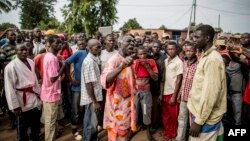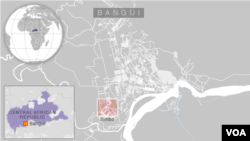GENEVA —
The United Nations refugee agency reports thousands of people have fled a church in the Central African Republic capital in the aftermath of a lethal attack Wednesday.
UNHCR officials say at least 17 internally displaced people were killed and 27 others reportedly abducted by the assailants.
At the time of the attack, 9,000 internally displaced people were sheltering at Notre Dame de Fatima in Bangui.
The agency describes the attack as one of the worst on any site for Bangui's internally displaced individuals since the Muslim Seleka group was removed from power in January.
"This attack may mark a turning point as, until now, churches, monasteries, and mosques largely have been safe havens for people forced to flee their homes throughout the country," UNHCR spokeswoman Fatoumata Lejeune-Kaba said, noting that 32 out of 43 sites in Bangui that house the internally displaced are religious institutions.
Lejeune-Kaba said insecurity in the capital has increased drastically since Sunday, with several fatal attacks reported before inter-communal hostilities culminated with Wednesday's attack on Notre Dame de Fatima.
“Those who fled from Notre Dame de Fatima have either moved to the surrounding neighborhoods or southwards towards ten sites in Bangui and the adjacent area of Bimbo," she added. "Many fled without anything — no money, no food, not even a mat to sleep on. Others had bullet wounds that need to be attended to urgently. Compounding their hardship, the overcrowded IDP [internally displaced people] sites they moved face shortages in water, food, shelter and basic healthcare.”
Lejeune-Kaba says violence continues outside the capital, in other parts of C.A.R. She says Muslim ex-Seleka groups were behind bloody clashes that erupted in the town of Bambari last week. Unlike that situation where the identity of the assailants is known, she says nobody knows who attacked the church in Bangui.
She tells VOA that most Muslims have left the country, so Christian anti-Balaka groups, which have been attacking them, have lost their main target.
“What we had noticed then in the change of transit is that the violence still continued within IDP sites by the anti-Balaka on Christians, so it is not religiously motivated, but it seems like they have arms and they use that power over IDPs to get whatever they want," she said. "It is becoming more criminal.”
Most if not all of the civilians in the IDP site near the airport in Bangui are Christians, she said. Despite this, they are being attacked, abused, arbitrarily arrested and abducted for ransom by anti-Balaka elements, she said.
UNHCR officials say at least 17 internally displaced people were killed and 27 others reportedly abducted by the assailants.
At the time of the attack, 9,000 internally displaced people were sheltering at Notre Dame de Fatima in Bangui.
The agency describes the attack as one of the worst on any site for Bangui's internally displaced individuals since the Muslim Seleka group was removed from power in January.
"This attack may mark a turning point as, until now, churches, monasteries, and mosques largely have been safe havens for people forced to flee their homes throughout the country," UNHCR spokeswoman Fatoumata Lejeune-Kaba said, noting that 32 out of 43 sites in Bangui that house the internally displaced are religious institutions.
Lejeune-Kaba said insecurity in the capital has increased drastically since Sunday, with several fatal attacks reported before inter-communal hostilities culminated with Wednesday's attack on Notre Dame de Fatima.
“Those who fled from Notre Dame de Fatima have either moved to the surrounding neighborhoods or southwards towards ten sites in Bangui and the adjacent area of Bimbo," she added. "Many fled without anything — no money, no food, not even a mat to sleep on. Others had bullet wounds that need to be attended to urgently. Compounding their hardship, the overcrowded IDP [internally displaced people] sites they moved face shortages in water, food, shelter and basic healthcare.”
Lejeune-Kaba says violence continues outside the capital, in other parts of C.A.R. She says Muslim ex-Seleka groups were behind bloody clashes that erupted in the town of Bambari last week. Unlike that situation where the identity of the assailants is known, she says nobody knows who attacked the church in Bangui.
She tells VOA that most Muslims have left the country, so Christian anti-Balaka groups, which have been attacking them, have lost their main target.
“What we had noticed then in the change of transit is that the violence still continued within IDP sites by the anti-Balaka on Christians, so it is not religiously motivated, but it seems like they have arms and they use that power over IDPs to get whatever they want," she said. "It is becoming more criminal.”
Most if not all of the civilians in the IDP site near the airport in Bangui are Christians, she said. Despite this, they are being attacked, abused, arbitrarily arrested and abducted for ransom by anti-Balaka elements, she said.









